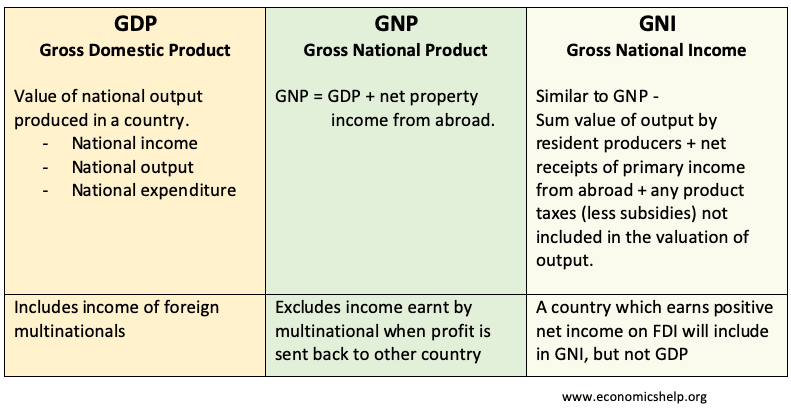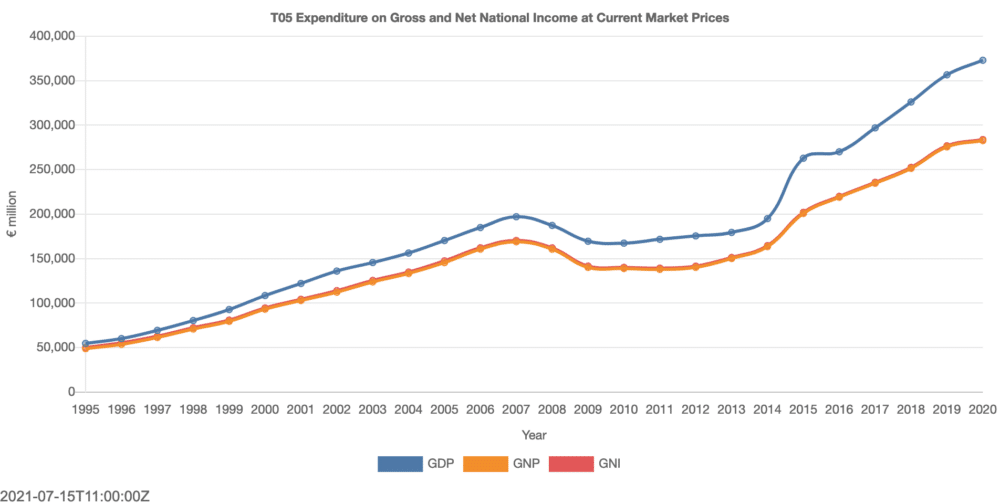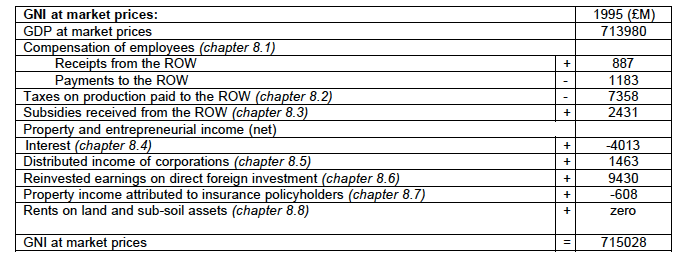GNP and GDP both reflect the national output and income of an economy. The main difference is that GNP (Gross National Product) takes into account net income receipts from abroad.
- GDP (Gross Domestic Product) is a measure of (national income = national output = national expenditure) produced in a particular country.
- GNP (Gross National Product) = GDP + net property income from abroad. This net income from abroad includes dividends, interest and profit.
- GNI (Gross National Income) = (similar to GNP) includes the value of all goods and services produced by nationals – whether in the country or not.

Example of how GNP is different to GDP
If a Japanese multinational produces cars in the UK, this production will be counted towards UK GDP. However, if the Japanese firm sends £50m in profits back to shareholders in Japan, then this outflow of profit is subtracted from GNP. UK nationals don’t benefit from this profit which is sent back to Japan.
If a UK firm makes a profit from insurance companies located abroad, then if this profit is returned to UK nationals, then this net income from overseas assets will be added to UK GNP.
Note, if a Japanese firm invests in the UK, it will still lead to higher GNP, as some national workers will see higher wages. However, the increase in GNP will not be as high as GDP.
- If a county has similar inflows and outflows of income from assets, then GNP and GDP will be very similar.
- However, if a country has many multinationals who repatriate income from local production, then GNP will be lower than GDP.
For example, Luxembourg has a GDP of $87,400 but a GNP of only $45,360.
A country like Ireland has received significant foreign investment. Therefore for Ireland, there is a net outflow of income from the profits of these multinationals. Therefore, Irish GNP is lower than GDP.

GNI
GNI (Gross National Income) is based on a similar principle to GNP. The World Bank defines GNI as
“GNI is the sum of value added by all resident producers plus any product taxes (minus subsidies) not included in the valuation of output plus net receipts of primary income (compensation of employees and property income) from abroad.” (World Bank)
The World Bank now use GNI rather than GNP.
UK GNI and GDP

from: pdf ONS (1995)
This shows a small net income from abroad, so the GNI £715,028m is greater than GDP (£713,980)
Related

Technically, lets not forget that net income from receipts abroad also includes wages earned by the country’s residents abroad. This explains why countries such as Belgium can have a substantially larger GDP in comparison to GNP (lots of non-resident labour).
PLEASE HELP WITH CLEAR MEANING AND EXAMPLE OF GNI OF A NATION EXAMPLE NIGERIA
who is responsible for classfication of GDP,GNP and GNI what are the benefits for these classfications?
WORLD BANK AND IMF MAINLY IMF
It is very informative contents.
then what is the real diff between gni and gnp? i don’t really understand the example given above.
what are their sole purpose?
Does the GDP includes the “income and production of investors from abroad” who are living in the country??
That reflects Gross National Product. The real question has to do with those nationals who work abroad and are NOT taxed. How does their income calculate into GNP? Remember, they provide no Income to their home economy. So, why would their wages earned be considered for GNP or GNI?
The term GDP (Gross Domestic Product) has correctly been called “The Growth Delusion”.
To be specific, Federal Reserve Economists are describing our Economy using a parameter that
does not represent the reality of our nation’s Economic Activity
Economic Activity is the result of the population in the Nation Spending Money on Whatever.
Our retirees are spending money but are producing nothing.
Education spending produces educated human beings.
Defense spending produces National Security. Health Care spending produces healthier human beings.
Entertainment spending ( Media, Professional sports) produces entertained human beings.
Spending on a physical product ( water, food and shelter ) keeps humans alive and able to get a good night’s sleep.
Spending on modern transportation (trucks,trains, airplanes, and ships powered by burning fossil carbon) allows humans to spend less labor on transportation.
The Sum of this Spending represents the Economic Activity of the Nation.
Economic Activity resulting from spending inflated money does not increase Quality of Life.
Americans were spending more to fight WWII in order to protect their Quality of Life.
Spending does not mean a better Quality of Life if overpopulation is degrading the Environment.
Spending by an overpopulation burning more fossil carbon does not mean a better Quality of Life when burning fossil carbon has degraded our atmosphere and as a result weather events are becoming more extreme.
then what is the real diff between gnp and GDP? i don’t really understand the example given above.
GDP means total of monetary value of all final goods and services produced by residents of a country in a financial year in economic area
GNP means total monetary value of final goods and services produced by citizens of a country in a financial year
Simple and clear ,,understandable
the examples make it easer for me to understand
between gnp and gdp,which is likely to be lower in developing countries?
Where does Patterson get his warped view of Economic Acitivity? The meaning “Economic Activity” can be skewed to be just as delusional as “Growth Delusion.”
I asked for gnp and gdp not gni at all it gives me three columns of info but I need only two of them and not all three, it confuses me a lot!!!!
how essential is GDP in developing country’s……and how can it be improved if it is low?
Let me ask my query with the following example:
GDP of India without consideration of following transactions is Rs. 100/-
Transactions left out:
1. An Indian company paid to foreign resident Rs. 20/-
2. An Indian resident earned Rs. 50/- from an overseas corporation
My Question is how will we arrive at GNP:
(A) Rs.100+20+NFIA
= Rs. 100+20+(50-20)
= Rs. 150/-
or
(B) Rs. 100 + NFIA
= Rs. 100+(50-20)
=Rs. 130
Both are wrong
GDP =100
GNP = GDP – Net Factor Income
(FACTOR Income earned from abroad – Factor income earned paid abroad)
= 100-(50-20)
= 70
130 is correct. GNP=GDP+Net Factor Income. 70 doesn’t make any sense.